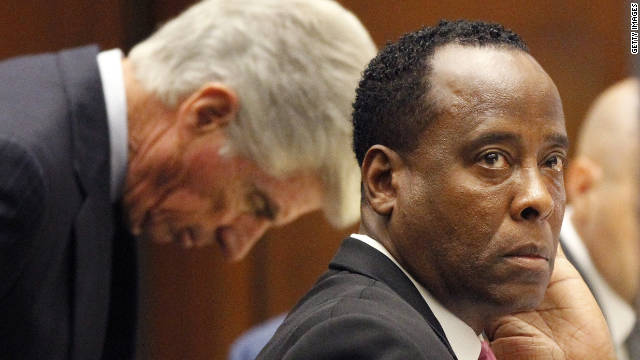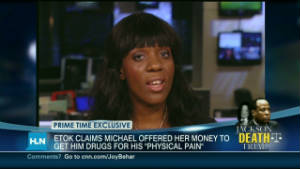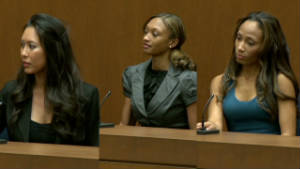 Tune in to HLN for full coverage and analysis of the Conrad Murray trial and watch live, as it happens, on CNN.com/live and CNN's mobile apps.
Tune in to HLN for full coverage and analysis of the Conrad Murray trial and watch live, as it happens, on CNN.com/live and CNN's mobile apps.Los Angeles (CNN) -- Michael Jackson's three children "cried and cried and cried" when an emergency room doctor told them their father was dead, Dr. Conrad Murray said in a police interview two days after the pop icon's death.
Jurors heard the last 45 minutes of the police interview Tuesdaymorning, the 10th day of Murray's involuntary manslaughter trial. Most of the audio recording was played in court Friday.
Perhaps the most disturbing moment came later when an overhead photo of Jackson's naked corpse on the autopsy table was displayed on a large screen in front of the jury. It was shown during testimony from the pathologist who ruled Jackson's death a homicide.
Jackson matriarch Katherine Jackson, who sat on the second row with daughter Rebbie Jackson for the first hour Tuesday, left the courtroom before the photograph was shown.
Dr. Christopher Rogers, who conducted the autopsy, said he ruled Jackson's death was a homicide because of Murray's reckless use of the surgical anesthetic propofol in Jackson's home to help him sleep.
"The risk outweighs the benefit," Rogers said.
He said it was possible that Murray gave Jackson an overdose, since he had no "precision dosing device" to keep Jackson asleep with propofol.
"Essentially, the doctor would be estimating how much propofol he would be giving," Rogers testified. "I think it would be easy under those circumstances for the doctor to estimate wrong and give too much propofol."
Rogers bolstered the prosecution contention that Murray used a makeshift IV setup to keep Jackson medicated and asleep.
The propofol bottle that prosecutors contend Murray used for the IV drip had a slit in the rubber top that appeared to have been made with a medical spike, not a syringe needle.
Murray could have pushed "a spike into the rubber stopper and then the propofol would flow out the end," Rogers said.
Rogers ruled out the possibility that Jackson self-administered the deadly dose of propofol during the two minutes Murray told police he was away from the singer's bedside.
Katherine Jackson was in court to hear Murray describe to detectives the reaction of her 11-year-old granddaughter, Paris, at the news that her father was dead.
"I will wake up in the morning, and I won't be able to see my daddy," Paris said, according to Murray.
Murray is not expected to testify during the trial, but the interview playback means jurors will have heard his story -- at least as he told it two days after Jackson's death.



The prosecution could benefit from the jury hearing Murray say he was away from Jackson for just two minutes before finding him without a pulse. Phone records and witnesses showed that moment came after he spent at least 45 minutes on his cell phone.
Murray's defense, however, may gain by the more personal view jurors get of the doctor without subjecting him to prosecution questioning.
The jury on Friday heard Murray's reasons for not immediately calling 911 for help, his explanation of his much-criticized CPR techniques, and his statement that he was trying to wean Jackson off a dependency on propofol.
Tuesday's interview playback began with Murray relating how Jackson's children "really were weeping, really weeping" when they were told doctors at Ronald Reagan UCLA Medical Center were unable to save their father.
"I hugged them all, gave comfort to Paris, comfort to Prince, comfort to Blanket, which is the last little guy, because whenever they were sick, they would always ask for Dr. Conrad," Murray said.
Murray, who treated Jackson and his children for colds and minor illnesses when they visited or lived in Las Vegas, was hired as Jackson's full-time physician just two months before his June 25, 2009, death.
"After they cried and cried and cried, then his daughter uttered a lot of words of unhappiness and, you know, she will live alone without her dad and she didn't want to be an orphan," Murray said, referring to Paris.
"She asked me, 'Dr. Murray, you said you save a lot of patients. You know, you save people with heart attacks, and you couldn't save my dad,'" he told detectives. "I said, 'I tried my best.' And she said, 'I know that, Dr. Murray. At least I know. I know you tried your best. I know you tried your best, but I'm really sad. You know, I will wake up in the morning, and I won't be able to see my daddy.'"
Murray said he also was unable to explain Jackson's death to other family members gathered in a conference room at the hospital.
"Do you know why he died?" one of them asked, Murray told police.
"My answer was 'No,' and that's the reason why I was recommending to the family to have an autopsy, because I also wanted to know," Murray said.
Prosecutors contend Jackson died because of Murray's criminal negligence, including the use of the surgical anesthetic propofol in his bedroom, without proper monitoring equipment.
The Los Angeles County coroner ruled that Jackson's death was the result of "acute propofol intoxication" in combination with several sedatives -- all drugs Murray acknowledged in the police interview that he gave Jackson in the hours before his death.
But in the portion of the interview to be heard Tuesday, Murray points the finger away from himself to other doctors.
"I was not aware of any other medications that he was taking, but I heard that he was seeing a Dr. Klein three times a week in Beverly Hills," Murray told police. "And he never disclosed that to me."
Defense lawyer Ed Chernoff contended at the start of the trial that Dr. Arnold Klein had addicted Jackson to Demerol, a narcotic pain reliever, during the singer's regular visits to his Beverly Hills dermatology clinic in the weeks before his death.
"His production team had said to me recently that his worst days in the set is when he had gone to Dr. Klein's office, which is about three times a week," Murray said in the interview. "And when he came back, he was basically wasted and required at least 24 hours for recovery."
Three earlier prosecution witnesses testified that they were aware of Jackson's frequent visits to Klein's office and that Jackson's speech would be slow and slurred afterward.
Toxicology tests did not find Demerol in Jackson's blood at the time of his death, but the defense contention is that it played a role because Jackson was unable to sleep because he was suffering from withdrawal from the drug.
Murray told police that Jackson was "showing signs of a withdrawal," but he suspected it was from propofol, which he said he was trying to wean Jackson off after two months of nightly use.
Jackson's death came after two nights of not using propofol. Murray said he gave him a series of three sedatives -- Valium, lorazepam and midazolam -- on the third night without getting him to sleep.
"It wasn't working," Murray said. "So, was he going through a withdrawal from that agent? Was it his mind that was forcing him to stay awake?"
After 10 hours of trying, Jackson begged him to give him propofol again, Murray said, which the singer called his "milk." He needed rest before an important rehearsal for his "This Is It" comeback shows.
"I've got to sleep, Dr. Conrad," Murray said Jackson pleaded to him. "I have these rehearsals to perform. I must be ready for the show in England. Tomorrow, I will have to cancel my performance, because you know I cannot function if I don't get to sleep."
By 10:40 a.m., Murray said, he gave in.
"I then decided to go ahead and give him some of the milk, so he could get a couple of hours sleep so that he could produce, because I cared about him," Murray said. "I did not want him to fail. I had no intentions of hurting him. And I was compassionate. But what I was doing, too, recognizing that Michael Jackson may have had a dependency to a substance. I was trying to wean him off."
On the recording, Murray insisted he kept a close watch on Jackson after he finally fell asleep. The physician never mentioned the long list of e-mails and calls that cell phone records later revealed.
The doctor said he left the room for about two minutes to visit the toilet. When he returned, he realized his patient had stopped breathing, Murray said.
"Immediately, I felt for a pulse and I was able to get a pulse in the femoral region," he said. "His body was warm. There was no change in color, so I assumed that everything happened quickly."
Murray told police he immediately started one-handed CPR on the bed alternately with mouth-to-mouth resuscitation on Jackson.
"I couldn't lift him off the bed by myself," Murray said. "What I did was to improvise. His bed is fairly firm, so I got my left hand under his body and I compressed with my hand not moving in place."
Jackson security chief Alberto Alvarez, the first person to join Murray in the effort, testified that he questioned Murray's knowledge of CPR techniques because he was trained to put a patient on a hard surface and use two hands.
Murray said he did not call 911 for help immediately because he expected answering the emergency operator's questions would take too much time away from the resuscitation efforts.
Instead, he ran down the stairs and shouted for the chef to summon help, and he placed a call to Jackson's personal assistant, Michael Amir Williams, to ask that he send a security guard upstairs, Murray said.
Murray said he tried his best to revive Jackson.
In the portion of the interview played Friday, Murray said Jackson told him that hiring him as his personal doctor was "divine guidance."
Murray said that when he agreed to be Jackson's personal physician for his "This Is It" shows in London, he had no idea he would have to give him regular infusions of propofol.
But it was a drug Jackson told him he had used for years to get elusive sleep, he said.
"I was a bit surprised of his pharmacological knowledge," Murray told police. "He explained that he used it frequently on his tours."
During his two months on the job, he gave Jackson propofol "30 days a month, every day, with the exception of three days leading up to his death," Murray said.
If convicted of involuntary manslaughter, Murray could spend four years in a California prison and lose his medical license.
No comments:
Post a Comment